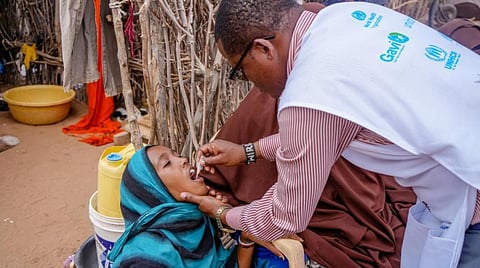

An estimated 33 million children in Africa need to be vaccinated between 2023 and 2025 to achieve the 2030 global immunisation target, according to the World Health Organization (WHO).
The 2030 global immunisation goals include reducing morbidity and mortality from vaccine-preventable diseases.
Without renewed political will and stepped-up efforts by governments, vaccination coverage in Africa will not return to pre-pandemic levels until 2027, noted an analysis released by WHO on April 20, 2023.
The unprecedented impacts of the COVID-19 pandemic derailed routine immunisation services in Africa. The pandemic has driven up the number of zero-dose (unvaccinated) and under-immunised children — up by 16 per cent in 2019-2021 — pushing the cumulative total to around 33 million, according to an estimate by WHO and UNICEF.
WHO is working with partners to support countries to get back on track to protect more people from preventable diseases.
“As countries strive to emerge from the long shadow of COVID-19, we cannot afford to lose further ground. Every effort must be made to ensure every child has access to essential vaccines,” said Dr Matshidiso Moeti, WHO regional director for Africa.
The global health body marked this year’s African Vaccination Week and World Immunization Week, from April 24-30, under the theme ‘The Big Catch-Up’. The Big Catch-up aims to protect populations from vaccine-preventable outbreaks, save children’s lives and strengthen national health systems.
WHO, UNICEF, Gavi, the Vaccine Alliance, the Bill and Melinda Gates Foundation and many other global and national health partners joined this year’s immunisation week to boost vaccination among children following declines driven by the COVID-19 pandemic.
WHO and its partners extended their support to 10 priority African countries — Somalia, Angola, Madagascar, Mozambique, Nigeria, Ethiopia, Chad, Cameroon, Democratic Republic of Congo and Tanzania — to carry out catch-up routine vaccination campaigns. These countries are among the top 20 nations globally with the highest number of zero-dose children
Nigeria is home to the second-largest number of zero-dose children (2.2 million) in the world, according to a UNICEF report.
African heads of state endorsed a declaration aimed at revamping and scaling up routine immunisation across the continent at a recently concluded event.
Decreased vaccination levels have led to a surge in outbreaks of vaccine-preventable diseases such as measles, meningitis, diphtheria, polio and yellow fever.
Over the past three years, despite the disruptions, at least a third of African countries have sustained the target coverage of 90 per cent or higher for the third dose of the diphtheria-tetanus-pertussis vaccine and the third dose of the polio vaccine, according to WHO.
More than 30 million children were vaccinated against polio in Malawi, Mozambique, Tanzania, Zambia and Zimbabwe in 2022, following the reporting of wild poliovirus type 1 cases in Malawi and Mozambique.
“The ambition to ensure that every child has access to essential vaccines by 2030 is still within our reach if we act now. It is time for us to renew our commitment to this ambition and work together to restore and strengthen essential vaccination services to save the lives of millions of children,” said Moeti.